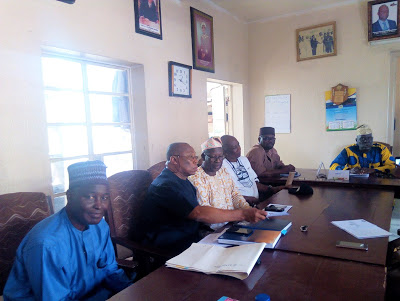Master Mariners disagree with SAA operation, review issues defining Nigeria’s maritime industry
...Seek thorough scrutiny of shipping coys as CVFF disbursement crystalizes
At the close of 2019, the Nigerian Association of Master Mariners (NAMM) as a professional body, sat to review issues of great concern in the nation’s maritime industry, with a view to ensuring that policy makers heed professional advice on the best way forward.
The mariners, comprising captains who have had successful careers at sea on various platforms globally, totally disagreed with the operation of a Secure Anchorage Area(SAA) at the Lagos Ports.
Recently, there was a heated disagreement between the Nigerian Ports Authority (NPA) and the private company operating the SAA, Ocean Marine Solutions Limited (OMSL) that provides security for foreign vessels at the anchorage.
Managing Director of the NPA, Hadiza Bala Usman, had declared the operation of the OMSL cancelled as the company collects a fee of $2000 on the first day and $1500 on subsequent days of being at the
anchorage.
anchorage.
The NPA MD had argued against making the shipowners pay additional cost for security, when the duty of the Nigerian Navy is to ensure security of the maritime domain for the benefit of everyone out at
sea.
sea.
However, after its investigation, the senate committee on the matter concluded that OMSL should continue with its operations since it was not adding costs to the government.
So, in its review, the master mariners, led by Captain Tajudeen Alao, said it was wrong to allow a private firm to be providing security for a group of people when it should provide more platforms for the Navy to perform their duty of securing the maritime domain.
He said: “What we do in international shipping is regulated by the United Nations Convention on the Law of the Sea (UNCLOS). You know the ocean is an open place and for all players to partake in it, there are regulations. But the duty of a Flag State, which is a member state of IMO, is responsibility to international community.”
Alao noted that it was binding on member states that have domesticated the laws to ensure monitoring and enforcement in the provision of succour, safety, security, management of the environment.
The country must also respond and ensure search and rescue for ships going through the coastal waters, including innocent passage, or a ship that is coming to visit you, and has problem.
“Shipowners should not provide private security for themselves. It is not acceptable internationally,” Alao said.
Contributing in same vein, Retired Rear Admiral Godswill Ombo, said: “Nobody should charge a ship that is in the anchorage a single penny. It is the prerogative of a captain to decide whether or not to go to a secure anchorage or continue on his way. If he decides to anchor there until he gets into the port, it is the responsibility of the government to provide him with security needed.”
He added that the ship does not have to pay additional money since he pays his port dues and some amount to NIMASA.
He expressed concern that the Senate Committee for the investigation, should have involved the master mariners, so that the issue was handled professionally.
According to the mariners, if a safe anchorage is provided in Lagos, what happens in Calabar, Bonny, Warri? What also happens to those who move by the water, but cannot pay the money? What about those using the fishing boats.
Contributing also, Capt. Iheanacho Ebubeogu said those paying for a secured anchorage were only tolerating Nigeria because of its big market.
He said: “People can tolerate us because we are a big market. But when it comes to where we want to become member of IMO category C member, people will go behind us and jeer at us.
“UNLOS section 17 says Coastal State must provide security including at anchorage. And the three infrastructure that the NPA provides are the anchorage, the Foul ground, where we keep wrecks that are
not economically useful, then the Spoil ground, where we keep things that we have dredged out.”
not economically useful, then the Spoil ground, where we keep things that we have dredged out.”
On the issue of the Cabotage Vessel Financing Fund (CVFF), Capt. Alao commended government’s decision to disburse the fund soon, and warned that the money must be committed to ship acquisition
for coastal trade.
for coastal trade.
“We want government to give the money to serious players who can make the industry grow. We don’t want ‘briefcase- carrying’ shipping companies to spring up because they hear that the money is available.
Although there is a law on how the money should go. We commend government for accepting
to disburse the money,” Alao added.
Although there is a law on how the money should go. We commend government for accepting
to disburse the money,” Alao added.
He lamented the state of traffic gridlock in the port city of Apapa, as a result of poor access roads, a situation he said had dragged in the last two decades.
He said: “Why the gridlock? Because of poor access road, road obstruction. Cargo evacuation, waiting time at anchorage, piracy, payment for ships at anchorage. The crew are frustrated, ship abandoned. The port is a customs border post, so, instead of discharging cargo, physical inspection, the scanner can clear this.”
The mariners also want the Federal Government to consider the viability of deep seaports before their establishment, so that the nation does not suffer a repeat of having some of them abandoned eventually or turned into other uses.
“We did Sapele Port, we did Warri Port, what happened? Sapela Port failed. It is now a Naval Base. Must we embark on what we know would fail? Good, there are going to be deep seaports, what about the access roads, the infrastructure?” the NAMM President asked.

